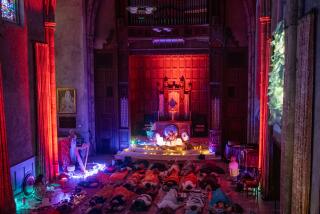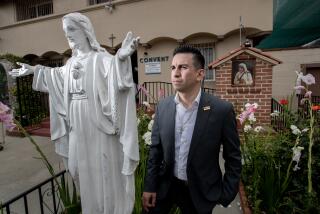‘Rave Masses’ Seek to Appeal to Those Raised on Television : Trends: Defrocked priest is bringing his unorthodox style to the Episcopal Church. Entertainment from the pulpit might include loud music, dancers and screens flashing slogans.
- Share via
SAN FRANCISCO — Matthew Fox, the avant-garde priest defrocked by the Vatican for his free-spirited theology, will mark his new identity as an Episcopalian with a high-tech, high-decibel “Rave Mass” later this year in the basement of Grace Cathedral.
Fox got the idea for the head-banger liturgy after visiting a band of unorthodox young Anglicans in England--where the “Rave in the Nave” features loud music, women dancing in bikinis and video monitors flashing messages such as “Eat God.”
“I’m grateful it’s in the basement,” said the Rev. Alan Jones, dean of Grace Cathedral, the seat of the Episcopal Diocese of California.
Rave Masses are part of a high-risk, high-energy attempt by Fox, 53, and the local Episcopal church to get the attention of young Americans bored by traditional Christian worship.
During Fox’s visit to England, the Mass was held in the basement of a sports complex and included 42 television sets flashing images of galaxies, dancing atoms, DNA, lunar eclipses and male-female archetypes.
“My first experience of the Mass was that this is a very friendly experience for a generation raised on television,” Fox said in an interview. “My second experience was that these people are taking television away from the broadcasters and doing it live in the heart of the community, which is worship.”
Fox--whose blend of Christianity, eco-mysticism and liberal politics led to a 10-year battle with the Vatican--now describes himself as a nondenominational priest.
“We don’t have a lot of time to fiddle around with whether we’re in this denomination or that one,” Fox said. “I challenge you to find any 20-year-old who can tell the difference between a Presbyterian, a Lutheran, a Methodist, an Episcopalian and a Roman Catholic. And who cares?”
Under Vatican pressure, the Dominican order dismissed Fox last year after he refused his supervisor’s order to leave his Institute for Culture and Creation Spirituality, based in Oakland, and move to Chicago.
Fox, an internationally known author and lecturer, was accepted into the Episcopal Church as a lay person this year in a quiet ceremony in Grace Cathedral. He is now being tutored in Anglican studies and is scheduled to be ordained as an Episcopal priest in December.
He hopes to celebrate his first Rave Mass in October.
Episcopal Bishop William Swing said he has talked to Fox about his theological ideas and has determined that “his understanding of Jesus Christ is both orthodox and biblical.”
“What makes him so controversial is that he attempts to translate the central revelation of Christianity in a vocabulary that is not easily recognized in traditional circles,” Swing said.
“He attempts to be a conduit for allowing a new generation to come to terms with creation and the primary human need to worship God.”
At a news conference at Grace Cathedral, Fox lamented that the Roman Catholic Church “is losing the spirits and adventurous energies of the young.”
“The Roman Catholic Church in this archdiocese alone is busy selling a dozen of its churches rather than asking the obvious question: ‘Why do people no longer want to attend church?’ ” he said.
Officials at Holy Names College in Oakland, the Catholic school that has housed Fox’s Institute for Culture and Creation Spirituality for the past decade, said they are saddened by Fox’s decision to join the Episcopal Church but that Fox will continue to be associated with the ecumenical institute.
Fox, whose mother was an Episcopalian, said in the interview that “there is more elbow room” in the Episcopal Church today.
“Look what they’ve done about ordaining women, about maintaining a balance of lay and clerical decision-making,” he said. “On issues of birth control or married priests, they have not hid their heads in the sand.”
Fox acknowledged that designer psychedelic drugs are popular in the Rave culture in both the United States and England.
That, he said, is exactly what the sponsors of Rave Masses in England are trying to combat. “The Rave culture did not begin with drugs,” Fox said. “You can go to drugs or you can go to religion, go to transcendence, go for the spiritual power of community and ritual.”
More to Read
The complete guide to home viewing
Get Screen Gab for everything about the TV shows and streaming movies everyone’s talking about.
You may occasionally receive promotional content from the Los Angeles Times.






